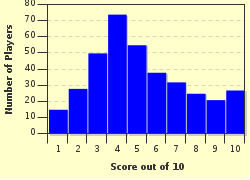Quiz Answer Key and Fun Facts
1. In the Psalms one often sees the word "Selah" at the end of a verse. There is some controversy, but which is generally agreed upon as the closest meaning?
2. Jesus accused the scribes and Pharisees of making "broad their phylacteries" in Matthew 23:5. What was a phylactery?
3. There is a creature, a leviathan, mentioned in Job, Psalms, on two occasions, and Isaiah that sounds fearsome! In Isaiah he is described as a
"_____ _____"(Isaiah 27:1, King James Version).
4. What is a "habergeon"?
5. Shigionoth is the plural of shiggaion, and the suggested meaning of this is a poetic mode describing emotions or wandering. We find this written at the beginning of Psalm 7 and also at the beginning of Habakkuk 3. What best describes what the author is doing in both passages?
6. This spice was brought by the three wise men to the baby Jesus as a gift with gold and frankincense in Matthew 2:11.
7. The word "hin" is mentioned numerous times in the Old Testament as a liquid measure. Approximately how much was a "hin"?
8. What was the bronze washbowl called that God instructed Moses should be made and "placed between the tabernacle of the people and the altar"? (Exodus 30:18)
9. Which money was used in the Old Testament times to pay for temple tax and so forth?
10. In Exodus and in the Psalms we hear mention of a "Timbrel", a musical instrument that was played by the Israelites in worship. What can it be likened to?
Source: Author
Gandi
This quiz was reviewed by FunTrivia editor
CellarDoor before going online.
Any errors found in FunTrivia content are routinely corrected through our feedback system.


